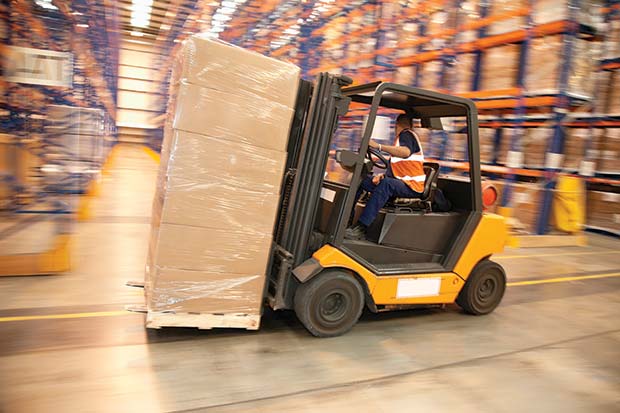For many warehouse and logistics managers, running and maintaining a forklift truck (FLT) fleet is part and parcel of the day job – and doing so as efficiently and cost-effectively as possible is a top priority. Warehouse & Logistics News looks at the reasons why the industry is increasingly turning to liquefied petroleum gas (LPG) as the FLT fuel of choice.
 When it comes to powering FLT fleets, warehousing and logistics operations have three options: LPG, diesel or electricity. Diesel-powered engines have historically been the most widespread, partly because they are known for their durability. However, diesel as a fuel also has a reputation for being costly and polluting, and importantly, diesel-powered FLTs aren’t suitable for indoor use either. Electric FLTs, on the other hand, provide an indoor-friendly alternative – but they too have their downsides, especially in terms of higher upfront costs.
When it comes to powering FLT fleets, warehousing and logistics operations have three options: LPG, diesel or electricity. Diesel-powered engines have historically been the most widespread, partly because they are known for their durability. However, diesel as a fuel also has a reputation for being costly and polluting, and importantly, diesel-powered FLTs aren’t suitable for indoor use either. Electric FLTs, on the other hand, provide an indoor-friendly alternative – but they too have their downsides, especially in terms of higher upfront costs.
That leaves LPG, which many industry professionals are now favouring over both diesel and electricity for their fleet. In fact, its growth in popularity is such that the FLT market is now one of the fastestgrowing segments of leading supplier Flogas’ LPG offering, and accounts for a significant proportion of the company’s commercial cylinder sales. So just what is it that makes LPG such an attractive FLT fuel?
Money, money, money
Cost is, of course, the bottom line for any successful business – so it’s no surprise that it’s the financials that are encouraging many warehouse and logistics managers to opt for LPG-powered FLTs. In comparison to electric trucks, the upfront costs associated with LPG are much lower.
This is because with LPG, there’s no need to purchase costly batteries, construct expensive recharging bays (which have the added disadvantage of taking up valuable warehouse space), or pay for battery disposal.
With diesel, upfront equipment costs may not be as much of an issue – but from an ongoing maintenance point of view, LPG-powered FLTs typically cost much less to run. This means businesses switching their fleet from diesel to LPG start benefitting from ongoing savings immediately.
Environmental credentials
Another big selling point of LPG over diesel is that it is a much cleanerburning fuel. Not only does this mean engines tend to last longer, but it also eliminates the risk of your FLTs leaving residual soot on the materials they’re handling. This is a particular bonus when moving products that need to be kept as clean as possible, such as food, textiles and pharmaceuticals.
What’s more, LPG also emits less CO2 than diesel, which is an important consideration for businesses striving to meet legally binding carbon reduction targets. As it also produces fewer PM10 particles (which are linked to respiratory problems), LPG could be better for employees’ health and wellbeing too.
Logistical benefits
The next area that fleet managers quite rightly focus on is how their FLTs fare from a day-to-day handling perspective. For example, noise pollution is often a key concern in warehouse settings, so the fact that LPG-powered engines are much quieter than their diesel counterparts is seen as a major advantage by many.
Easy refuelling is another marker for success, especially in large organisations where FLTs are subject to extensive use. Unlike electricity, which can be susceptible to power cuts, LPG is readily available and offers a consistent supply all year round, regardless of the weather. Electric trucks also require regular charging (which can lead to unproductive downtime), whereas refuelling LPGpowered FLTs is quick and easy.
This is especially true of Flogas’ range of Gaslight cylinders, which are almost half the weight of traditional LPG cylinders – making handling and transportation simpler than ever. And despite being so lightweight, Gaslight cylinders are also incredibly robust, as they’re made of toughened plastic and fiberglass. They are even deliberately designed to be translucent, so FLT operators can see at a glance when fuel is running low.
Finally, LPG-powered FLTs offer a level of versatility that neither diesel nor electric models can truly rival. This is because they typically have a better power-to-weight ratio and more responsive engines, meaning they can adapt to tackle a variety of difficult tasks. Unlike diesel FLTs (which can’t be used inside) and electric FLTs (which aren’t suitable for prolonged periods of outdoor use), LPG-powered FLTs are ideal for both indoor and outdoor jobs. Importantly, this means your staff only need to be trained to operate one type of FLT, not two.
The bottom line
As warehouse and logistics managers inevitably continue to seek out ways to make their FLT fleets cleaner and greener – as well more efficient, cost-effective and userfriendly – the industry’s shift away from diesel as a truck fuel shows no sign of slowing. Cue LPG-powered FLTs, which tick many of these boxes in a way that neither diesel nor electric trucks can.
FLOGAS
Tel: 0808 278 5819




Comments are closed.